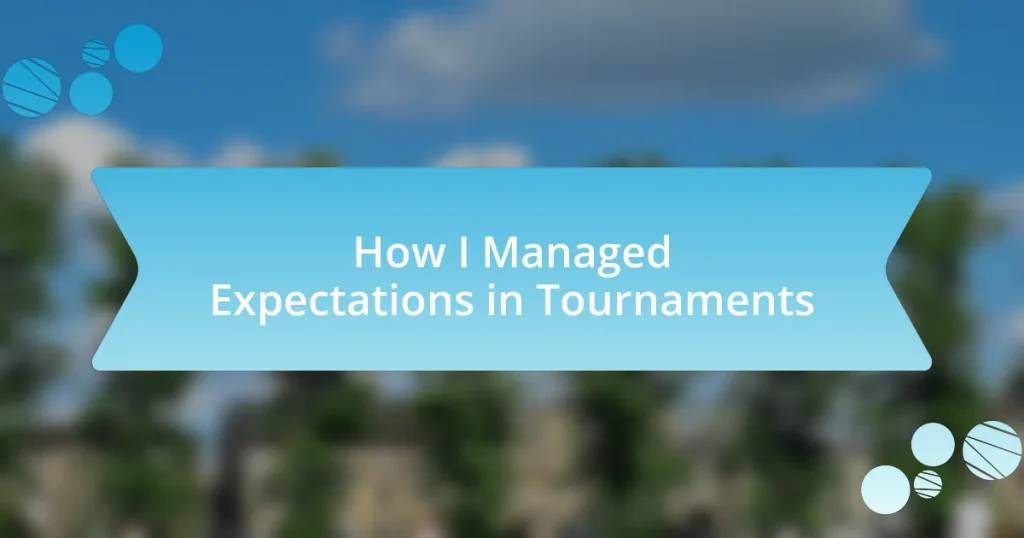Key takeaways:
- Expectation management involves shifting focus from outcomes to personal growth, reducing pressure and enhancing enjoyment during competitions.
- Setting realistic goals allows for authentic self-assessment, growth, and fosters community support among competitors.
- Analyzing past performances helps identify areas for improvement and reinforces a mindset of continuous learning and resilience.
- Open communication with teammates strengthens bonds, alleviates stress, and enhances performance through collective strategy and support.
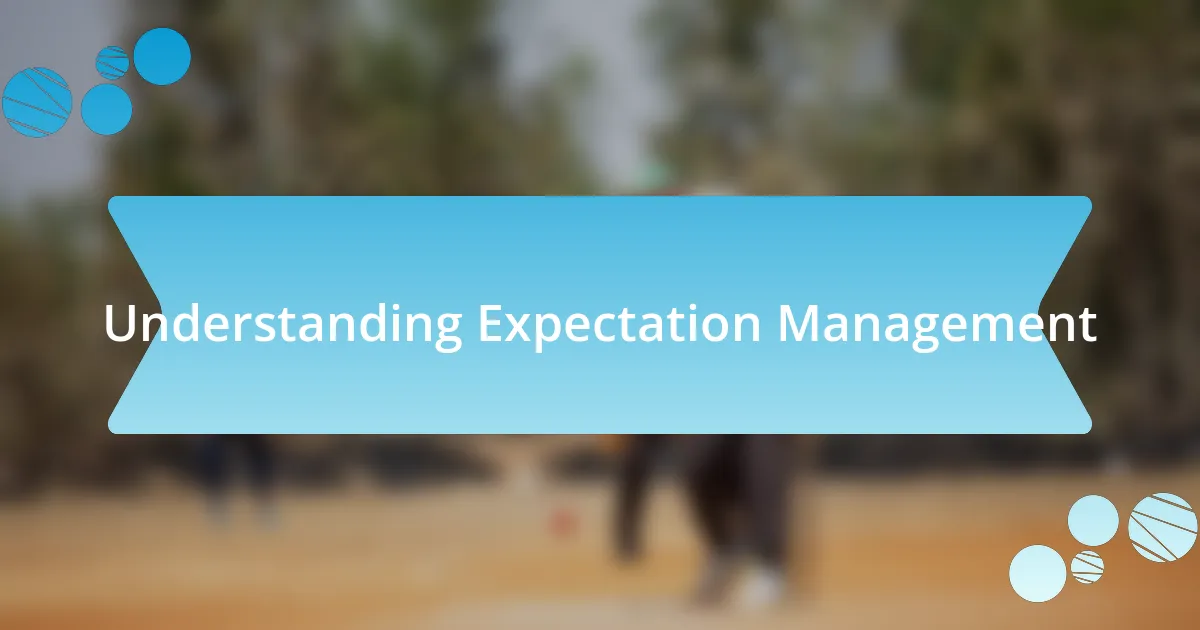
Understanding Expectation Management
Expectation management is a critical aspect of competitive environments, particularly in tournaments. I remember one specific event where I had my eyes firmly set on winning. However, I soon realized that focusing solely on the outcome created an unhealthy level of pressure. Have you ever felt that weight on your shoulders? I found it essential to redefine my expectations, shifting my focus from results to personal growth and enjoyment.
In the heat of competition, it’s easy to get caught up in what others expect of you. During one tournament, my friend confided in me about feeling overwhelmed by the pressure to live up to external standards. That conversation made me reflect on my own experiences; I realized that setting realistic, personal benchmarks was key. Have you thought about how setting your own standards can transform your experience? It allows for a more fulfilling journey, where each match becomes a chance to learn rather than just a means to an end.
Emotion plays a significant role in how we manage expectations. I vividly recall a match where an unexpected loss left me feeling disheartened. In that moment, I had to remind myself what I had learned throughout the process. It was a powerful lesson in resilience. Isn’t it fascinating how our emotional responses can guide our expectations? By accepting that setbacks are a part of the journey, we can cultivate a healthier mindset, leading to improved performance and satisfaction.
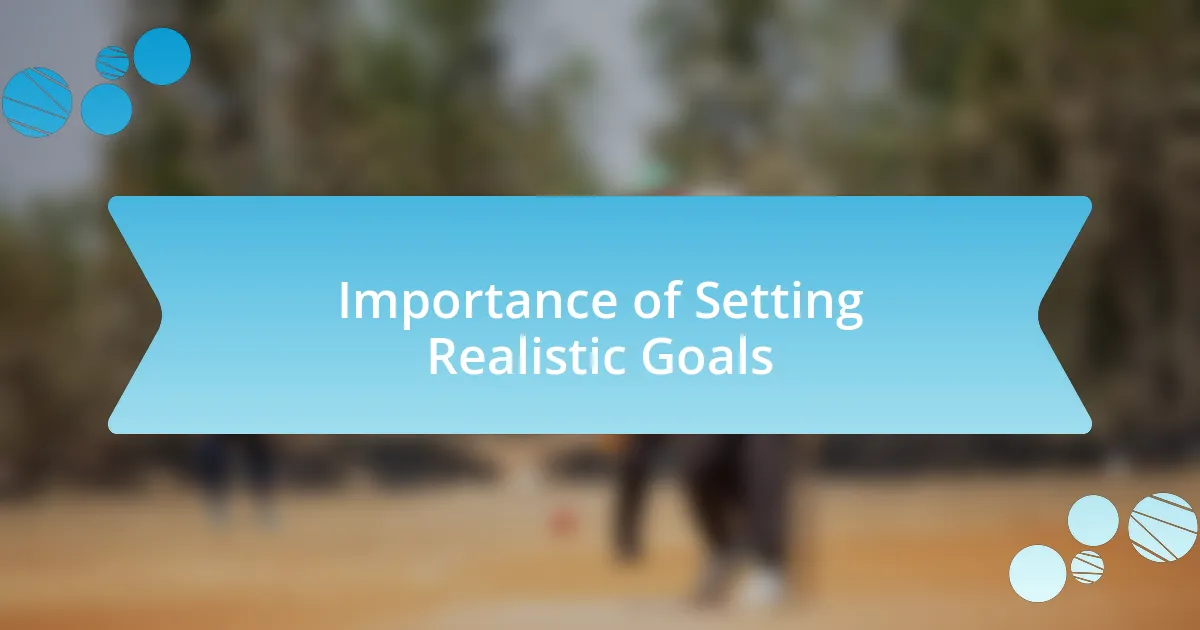
Importance of Setting Realistic Goals
Setting realistic goals in tournaments serves as a grounding mechanism in the midst of competitive chaos. I recall stepping onto the court for a tournament, fully motivated but also nervous about the high stakes. Instead of saying, “I need to win,” I shifted my mindset to, “I want to improve my serve and enjoy the experience.” This small change in goal setting made the process significantly more enjoyable and less stressful. Have you ever found clarity and confidence by adjusting your focus?
Moreover, realistic goals allow for authentic self-assessment and growth. During another competition, I aimed to achieve a personal best rather than worrying about my opponents’ performances. Unexpectedly, I not only achieved that goal but also surprised myself with a new skill during a match. It was exhilarating! Reflecting on this experience, I learned that when we set attainable and meaningful goals, we empower ourselves to take risks without the crippling fear of failure.
Lastly, having realistic expectations can foster a sense of community and support among competitors. I remember chatting with fellow players, sharing our individual goals and challenges. This camaraderie eased my anxiety and made me appreciate the journey rather than just the outcome. Isn’t it remarkable how realistic goal-setting can transform the competitive landscape into a supportive environment where everyone can thrive?
| Aspect | Realistic Goals |
|---|---|
| Emotional Impact | Reduces pressure and anxiety |
| Focus | On growth and personal achievements |
| Community | Encourages support among peers |

Analyzing Past Tournament Performance
Analyzing past tournament performance is pivotal for refining our approach in future competitions. I often find myself looking back at various matches, noting both my successes and areas for improvement. One striking match comes to mind where I lost due to a lack of focus. Analyzing that experience, I recognized that my mindset had shifted during the game. Instead of concentrating on each point, I became overly aware of the score. This realization taught me the importance of maintaining a steady mental state throughout.
Reflecting on specific aspects of my performance can be enlightening. Here are a few factors I consider when analyzing past tournaments:
- Decision-Making: Were my choices during crucial points effective?
- Physical Condition: Did I manage my stamina and energy correctly?
- Preparation: How well did I prepare mentally and physically for this tournament?
- Adaptability: Was I able to adjust my strategy in response to my opponent’s playstyle?
- Emotional Resilience: How did I manage my emotions during the match, and what impact did that have on my performance?
By delving into these elements, I uncover patterns that inform my future goals and expectations. This analytical process helps me recognize that each tournament is not just about the outcome, but also about continuous growth and learning.
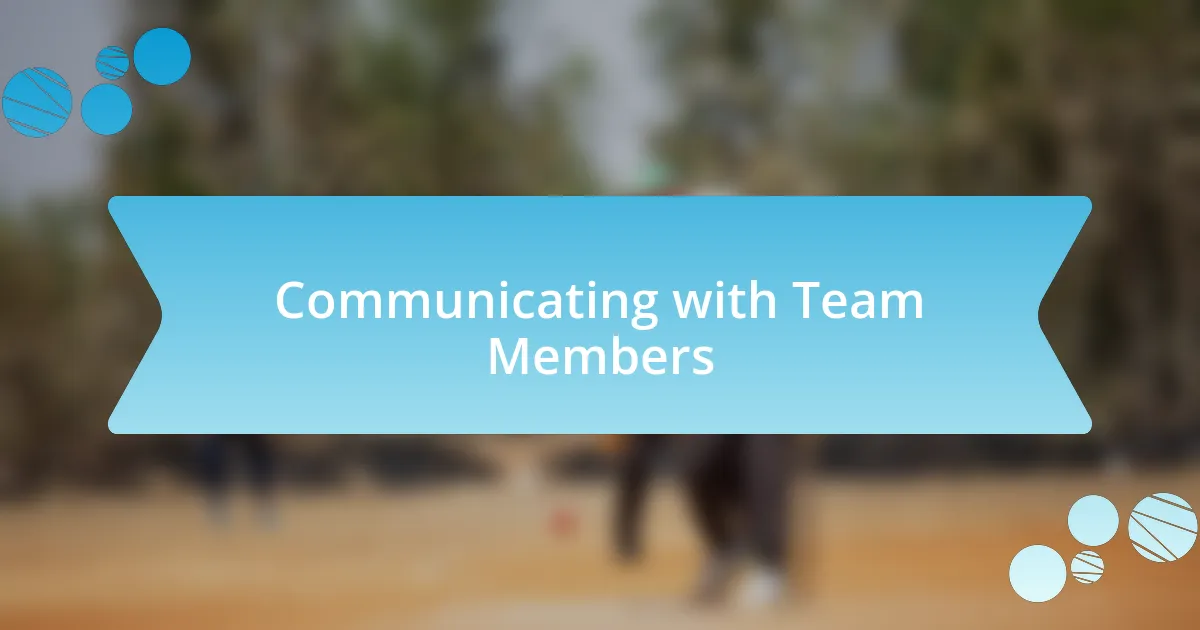
Communicating with Team Members
Being open and honest with my teammates has always been a cornerstone of effective communication in tournaments. There was a time when I hesitated to voice my concerns before a big match, thinking it might shake the team’s confidence. But I’ve learned that sharing fears or doubts can actually strengthen our bond and ensure everyone is on the same page. How many times have I sat in a huddle, feeling anxious while everyone else seemed calm? Opening up about those feelings allowed us to develop trust and support each other.
During one tournament, I vividly remember a moment when a teammate felt overwhelmed by the impending match. Rather than brush it off, I took a moment to listen. This simple act not only eased their anxiety but also opened the door for everyone to share their feelings. By fostering this environment, we collectively strategized better and lifted each other’s morale. Have you ever experienced a moment where honest dialogue transformed your approach? I certainly have, and it reminded me of how much lighter the burden feels when shared.
Moreover, I’ve found that keeping communication consistent throughout the tournament is crucial. Before each match, we set aside a few minutes to discuss our intentions and fears. These check-ins keep us aligned and motivated. I remember once, before a particularly tough matchup, one of our discussions highlighted each person’s strengths. This reestablished my confidence and led to a coordinated effort on the court. Isn’t it fascinating how a few words can have such a profound impact on performance?

Techniques for Adjusting Mindset
Adjusting my mindset during tournaments often came down to visualization techniques. I recall one particularly high-stakes match where I visualized myself executing each play flawlessly. This mental rehearsal not only calmed my nerves but significantly boosted my confidence. Have you ever imagined something going perfectly in your mind, only to see it unfold in reality? It’s a powerful tool that transformed my anxiety into a focused determination.
In addition to visualization, I discovered the importance of positive self-talk. Before stepping onto the court, I would remind myself of past successes, chanting phrases like “I am prepared” or “I can handle this.” These affirmations served as a shield against self-doubt. One time, during a critical game, a negative thought crept in about my performance. Instead of letting it fester, I quickly countered with my mantra. This shift in mindset turned my anxiety into excitement. Isn’t it amazing how the words we tell ourselves shape our reality?
Mindfulness practices also became essential in managing my expectations. I started incorporating short breathing exercises in the moments leading up to a match. Just taking a few deep breaths helped ground me, allowing my focus to settle on the present rather than get lost in what-ifs. There was one tournament where these moments of mindfulness made a noticeable difference. I felt more present, responsive, and connected with my teammates. Have you ever tried to center yourself in a moment of chaos? It’s a simple technique that can yield significant results.
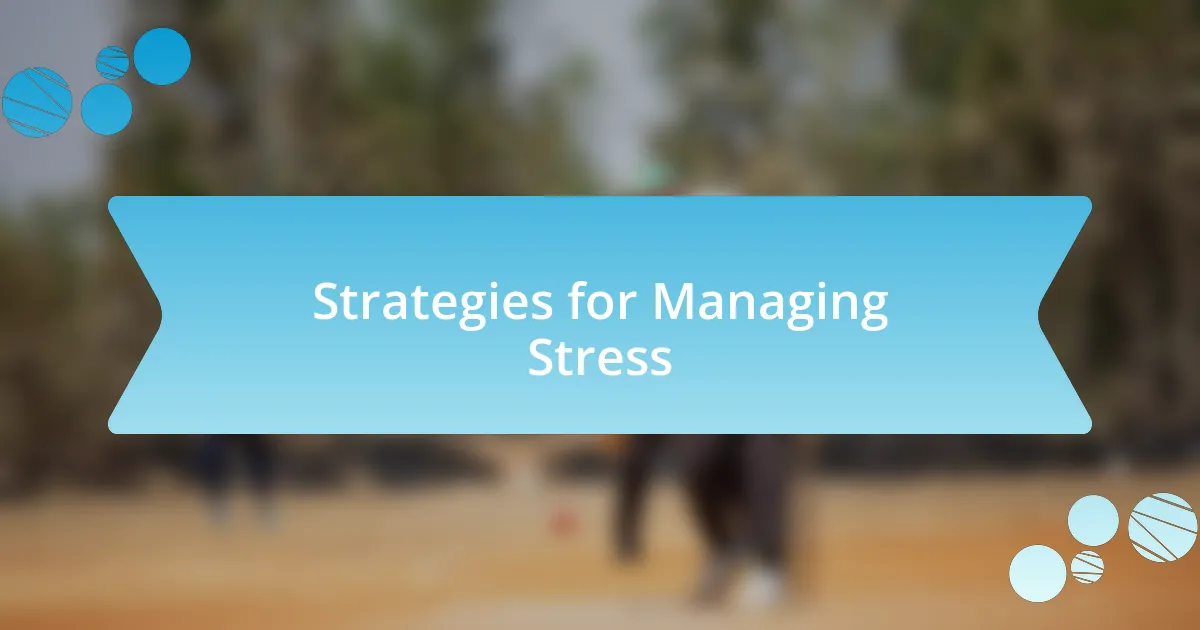
Strategies for Managing Stress
Managing stress during tournaments can be a daunting task, but I found that creating a pre-game routine was vital for my mental state. Before each match, I would listen to my favorite music while engaging in light physical warm-ups. This combination not only got my blood flowing but also set a positive tone. Have you ever noticed how certain songs can instantly lift your mood or transport you to a different mindset? It’s fascinating how such simple actions can prepare us both physically and emotionally.
During high-pressure moments, I also relied on the power of grounding techniques. I vividly remember a nail-biting encounter where the pressure was palpable. In those moments, I would focus on the sensations around me—the feel of the court beneath my feet, the sounds of the crowd, the smell of the gym. By anchoring myself in the present, I was able to push away the overwhelming anxiety. Isn’t it intriguing how tuning into our surroundings can pull us back from the brink of panic?
Additionally, I leaned on my support network to help alleviate stress. In one particularly tough tournament, I shared my feelings with a fellow player, and we ended up discussing our shared worries over dinner. Just voicing those fears lightened my load, making me feel less isolated. Have you ever felt a sense of relief after simply talking about what’s bothering you? Sharing experiences with others can create a powerful sense of camaraderie that not only eases stress but also builds a stronger team dynamic.

Learning from Each Experience
Learning from each experience is essential for growth, especially in competitive tournaments. I remember a particularly challenging match where I underestimated my opponent’s skills. After losing, I realized that I hadn’t fully analyzed their playing style. Reflecting on that match taught me the importance of thorough preparation. When was the last time you learned something valuable from a loss?
Each tournament offers a wealth of insights that can fuel future success. After every event, I took time to jot down notes about what went well and what could be improved. I can still feel the satisfaction of ticking off my progress over time. This practice not only provided clarity but transformed my mindset into one of continuous learning. How often do you take a moment to reflect on your performances?
Ultimately, embracing a growth mindset has been transformative for me. It’s like turning each challenge into a stepping stone rather than a stumbling block. I vividly recall a point where my best friend pointed out the areas I could enhance, and instead of taking it to heart negatively, I switched to viewing it as constructive criticism. Have you ever had someone help you see a situation in a new light? By welcoming feedback and embracing every experience, I learned to see setbacks not as failures, but as opportunities for growth and resilience.










